|
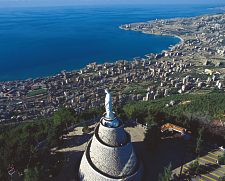
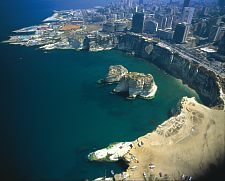
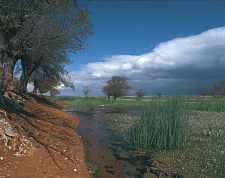
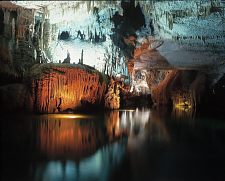
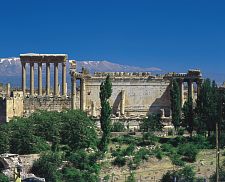
| |
Can Beirut Make Another Comeback?
By JENNIFER CONLIN
The New York Times | Journeys - August 6, 2006
BEIRUT is back,” Silversea Cruises recently announced on its Web site, promoting
its Mediterranean voyages with stops in the Lebanese capital. “One of the best
party destinations in the Middle East,” declared the British edition of Condé
Nast Traveler. Travel & Leisure just named Beirut one of the “Top 10 Cities in
the World” (a distinction it shared with Florence and Sydney, among other travel
hot spots); the third Time Out Beirut was recently published; and a brand new
Lebanese government tourism Web site had just been started, proclaiming the
country “a well-kept tourist secret that begs exploration.” Meanwhile, the chef
Anthony Bourdain was in Lebanon in July preparing an episode of “No
Reservations,” his show on the Travel Channel.
Then, as Mr. Bourdain, who was in Beirut on the day two Israeli soldiers were
kidnapped by Hezbollah, said in phone interview last week, “Everything went
sour.”
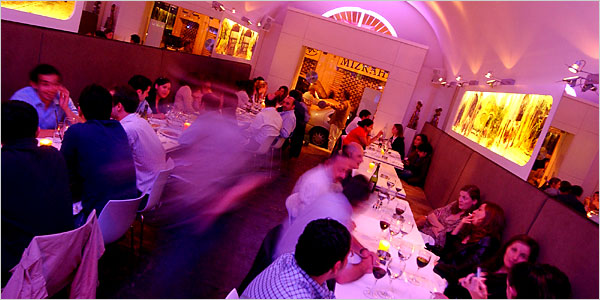
SRI International, a nonprofit research and development organization that has
been working with Lebanon to develop its tourism, says that 1.6 million visitors
were expected in Lebanon by the end of this year, breaking the previous record
of 1.4 million in 1974. Just as Lebanon was shedding its image as a war-ravaged
danger zone and benefiting from the rebirth of its tourism industry, its hopes
of once again becoming a major tourist destination have abruptly been
short-circuited.
“In the last three or four years, Beirut truly regained its mantle as the ‘Paris
of the Middle East’, ” said Ian Bradley, a spokesman for the Association of
Independent Tour Operators, an organization that represents 156 British-based
operators. “It has Old World charm, mountains, beaches and incredible ruins.”
John A. Mathieson is a director of SRI International, which has been working
with Lebanon since 1998. “Lebanon had made an enormous recovery following the
civil war and were attracting tourists from both the East and West,” he said.
“We have no doubt that the sector will rebound, but recent events could have a
devastating impact.”
They have already. Silversea called off plans to stop in Beirut and is
rethinking its coming cruises to Lebanon, Condé Nast Traveler has posted a
travel warning on an article about Beirut on its British Web site, and tour
operators have for now abandoned expansion plans into the Lebanon. According to
Mr. Bradley, four of his association’s members — Cox & Kings, Explore Worldwide,
Andante and Sunvil — have dropped Lebanon from their itineraries. “With the
Foreign Office advising against travel there, everything has to be canceled for
the foreseeable future,” Mr. Bradley said.
According to Lebanon’s tourism ministry, the Lebanese economy had only recently
started to bounce back from an 11 percent decline in the number of tourists
after the 2005 assassination of the former prime minister, Rafik Hariri. By the
end of this year, the ministry was hoping to generate nearly $2.5 billion from
tourism, which United Nations figures show as the largest sector of the
country’s gross domestic product.
“The city was full of young, beautiful party animals, sexily dressed,” Mr.
Bourdain said of the two days he spent wandering around Beirut before the
bombing forced him inside. “Everyone was speaking different languages — French,
English, German and Arabic. It could have been South Beach, Miami.”
It wasn’t only Beirut’s nightclubs and restaurants — some of them built along
the Rue Monot, part of the battleground of Muslims and Christians during the
15-year civil war that started in 1975 — that Lebanon had going for it. The
Faraya-Mzaar ski resort, with its high peaks and treeless landscape, was being
promoted as a “see and ski” experience by Crystal, a leading British ski
company. Crystal says it has stopped selling packages to the resort, which has a
peak at 8,000 feet, an Inter-Continental Mountain Hotel and Spa and, as
Crystal’s Web site describes it, a “high-altitude hip party scene” — all only
about 25 miles north of Beirut. “We will keep a close eye on the situation,”
said Melvin Westlake, a Crystal spokesman, adding that part of the problem is
that skiers must fly into Beirut to reach the resort.
CERTAINLY, whether it was for the Beirut night life, the growing skiing scene or
the increasingly popular wine tours in the Bekaa Valley, there were signs that
tourism was increasing sharply. This summer, British Mediterranean Airways, a
British Airways partner, added an eighth flight to its weekly schedule between
Beirut and London. “We have been flying there for 12 years, but this year it has
been an exceptionally popular destination,” said Alexandra McHaines, a
spokeswoman for the airline, adding that more tourists had been joining the
business travelers on their flights. “We are keen to get back in there,” Ms.
McHaines said.
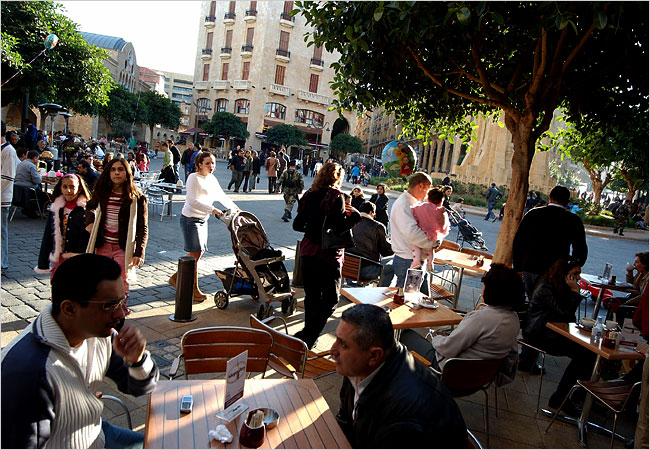
Similarly, the Four Seasons company, which has a hotel scheduled to open late
next year in Beirut, still plans to complete construction. “Our Beirut hotel is
still very much on the project pipeline,” said Elizabeth Pizzinato, the
company’s vice president for public relations. “We go into projects with a
long-term view, and once we commit to them we stay with them,” she said. “After
9/11 we were one of the few hotel companies that did not stop any of our
projects.”
Paul Mathews, president of Ecosign, a mountain-resort design company based in
Whistler, British Columbia, is also optimistic. His company is involved in what
could become Lebanon’s largest tourism project — two mountain resorts that will
cost more than $2 billion. “I spoke to our Lebanese clients last week,” he said.
“I thought they might want to cancel now, but the fact that they do not is
indicative of their confidence and greater long term vision for the country.”
Mr. Mathews said he was still working toward a 2011 opening of the resorts.
Katherine Johnston, an SRI International economist, said that many of the
tourists in Lebanon during the last five years had been from the gulf states.
“After 9/11 it was often easier to travel here than other places, and they have
their own issues in their states and are used to eruptions,” she said. “If there
is a meaningful peace and a resolution of the situation in Lebanon, tourists
from those areas will come back. But it will take longer for them to get back
tourists from Europe and the U.S.”
Mr. Mathews of Ecosign said his proposed mountain resorts were also primarily
aimed at the Arab market, and he was positive about the future. “Lebanon is Arab
speaking but not Arab thinking, which makes it a great vacation spot for the
Arabic world,” he said.
“The tourism industry will definitely come back,” said Warren Singh-Bartlett,
the Middle East correspondent for Wallpaper, the British design and travel
magazine, which published a major article on Beirut in its June issue. “I think
you will see some tourists come back out of solidarity for Lebanon and what it
has been through.”
A statement on Time Out Beirut’s Web site now reads, “We are hoping for a fast
recovery and rest assured we will come back stronger and bolder.” Mr. Mathieson
of SRI said: “The Lebanese tourist industry is very resilient. They know how to
adapt and recover and will do it again.”
Or as Mr. Bourdain said, “If Syria, Israel and Iran would just leave them alone,
I think they would rebuild and start the party all over again.”
|